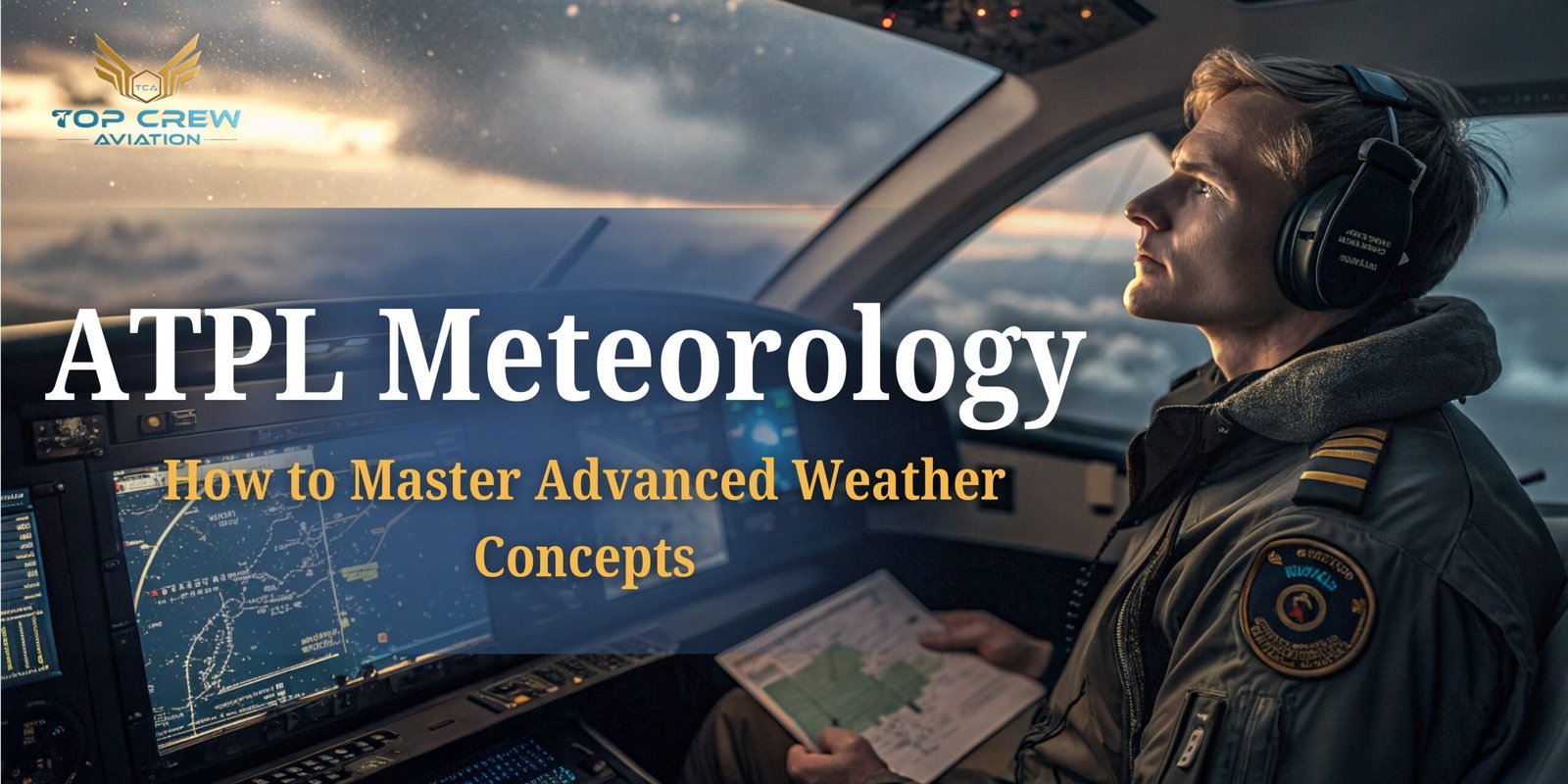
Introduction
Meteorology is one of the most important subjects in ATPL (Airline Transport Pilot Licence) exams. Weather plays a critical role in aviation safety, flight planning, and day-to-day operations. Mastering ATPL Meteorology not only helps you clear DGCA exams but also builds the foundation of your flying career. In this guide, we will cover the eligibility, syllabus, exam pattern, preparation tips, training fees, challenges, and the role of coaching so you can fully understand how to master Meteorology for ATPL.
What is ATPL Meteorology?
ATPL Meteorology is the study of weather and atmosphere in relation to aviation. It covers advanced concepts like atmospheric pressure, wind systems, jet streams, thunderstorms, icing, turbulence, monsoons, and weather reports (METAR, TAF, SIGMET). This subject is part of the DGCA’s ATPL exam in India and carries significant weightage. Pilots need to interpret weather data accurately to make safe flight decisions.
In short, ATPL Meteorology helps pilots understand, predict, and react to changing weather conditions.
ATPL Eligibility & Age Limit
Before you begin preparing for ATPL Meteorology, it is important to understand the eligibility requirements set by DGCA (Directorate General of Civil Aviation). Meeting these criteria ensures that you are qualified to attempt the ATPL exams in India.
Basic ATPL Eligibility Criteria
- Minimum Age: You must be at least 21 years old to apply for an ATPL in India.
- Valid CPL (Commercial Pilot Licence): Holding a CPL issued by DGCA is mandatory before appearing for ATPL subjects like Meteorology.
- Flying Experience: A minimum of 1,500 hours of total flight time is required. This ensures you have enough practical exposure to apply meteorology concepts in real-world flying.
- Medical Fitness: You must hold a valid Class 1 Medical Certificate to prove your physical and mental fitness for airline operations.
- DGCA Theory Papers: Passing the DGCA theory exams, including ATPL Meteorology, Air Navigation, and Radio Aids, is compulsory.
Why Eligibility Matters for Meteorology?
Meteorology is not just a theoretical subject; it is directly linked to flight planning, weather interpretation, and safe airline operations. By ensuring you meet the eligibility requirements, DGCA confirms that you have the necessary flying experience, knowledge, and maturity to understand advanced weather concepts.
Once you fulfill these requirements, you are officially eligible to appear for the ATPL Meteorology exam in India.
ATPL Meteorology Syllabus (DGCA Updated)
The DGCA ATPL Meteorology syllabus is designed to test a pilot’s ability to understand and apply advanced weather concepts in real-world flying. Every aspirant preparing for ATPL exams in India must cover these topics thoroughly, as they carry high weightage in the written papers.
Key Topics in the ATPL Meteorology Syllabus
- Atmosphere – Structure of the atmosphere, temperature variations with altitude, and the significance of the troposphere and tropopause.
- Pressure Systems – High and low pressure areas, pressure gradients, and their effects on wind patterns.
- Temperature & Humidity – Lapse rate, dew point, relative humidity, and how these impact cloud formation.
- Wind Systems – Jet streams, trade winds, sea/land breezes, and local wind effects on flight performance.
- Clouds & Precipitation – Cloud formation, cloud classification (Cumulus, Stratus, Cirrus, etc.), rainfall types, and visibility issues.
- Weather Hazards – Turbulence, icing conditions, thunderstorms, downdrafts, and wind shear.
- Air Masses & Fronts – Cold fronts, warm fronts, occluded fronts, and frontal weather.
- Tropical Cyclones & Monsoons – India-specific weather systems and seasonal impacts on aviation.
- Meteorological Codes – METAR, TAF, SIGMET, and NOTAM interpretation for flight planning.
- Weather Charts – Synoptic charts, significant weather (SIGWX) charts, and upper air analysis charts.
DGCA Updates in Meteorology Syllabus
The DGCA frequently updates the ATPL Meteorology syllabus to match global aviation standards and ICAO guidelines. Aspirants are strongly advised to check the latest syllabus before starting preparation to avoid missing out on newly added concepts or updated exam trends.
Mastering the ATPL Meteorology syllabus is not just about clearing exams—it’s about building the practical knowledge required for safe and efficient airline operations.
ATPL Exam Pattern & Marking Scheme
The DGCA ATPL Meteorology exam is conducted in a structured format to test a pilot’s understanding of advanced weather concepts. Knowing the exam pattern in advance helps aspirants prepare more effectively and manage time during the test.
ATPL Meteorology Exam Pattern (DGCA)
- Type of Questions: Objective – Multiple Choice Questions (MCQs)
- Duration: 2 to 3 hours (depending on DGCA schedule)
- Passing Marks: Minimum 70% required to qualify
- Syllabus Coverage: Complete ATPL Meteorology syllabus including atmosphere, winds, weather codes, hazards, and charts
- Marking Scheme: Currently, there is no negative marking as per DGCA guidelines
Importance of Meteorology in ATPL Exams
Meteorology is one of the core ATPL subjects and carries significant weightage. Scoring well in this paper not only boosts your overall performance but also gives you a stronger foundation for real-world airline operations. Since weather knowledge directly affects flight safety, DGCA ensures that Meteorology is thoroughly tested.
A good score in ATPL Meteorology can be the deciding factor in clearing your ATPL exams on the first attempt.
ATPL Training Fees
The training fees for ATPL Meteorology depend on whether you choose self-study or coaching:
- Self-study: ₹5,000 – ₹15,000 (books, online resources, DGCA fees)
- Ground school / coaching: ₹30,000 – ₹60,000 (depending on academy)
- Full ATPL Ground Classes package: ₹1,20,000 – ₹1,80,000 (all subjects)
Top aviation coaching institutes in India also provide mock tests, DGCA exam assistance, and one-on-one mentoring for ATPL aspirants.
Preparation Tips for ATPL Meteorology
Preparing for ATPL Meteorology is not about rote memorization—it requires a smart study plan, strong fundamentals, and practical application. Since Meteorology is a high-weightage subject in ATPL exams, following the right strategy can make your preparation more effective.
Tried & Tested Study Tips
- Start with Basics – Build a strong foundation by learning the structure of the atmosphere, wind systems, and cloud types.
- Use Diagrams & Charts – Weather charts, frontal systems, and cloud classifications are best understood visually. Make quick sketch notes for revision.
- Study from Standard Books – Refer to trusted resources like the Oxford ATPL series, Meteorology for Pilots, and DGCA-approved study material.
- Practice METAR & TAF Decoding – These codes are frequently tested and also highly relevant for real airline operations.
- Attempt Mock Tests – Simulate the actual DGCA exam environment to improve speed, accuracy, and time management.
- Revise Regularly – Meteorology has numerous formulas and technical terms, so frequent revision is essential to retain information.
Consistency is the key. Studying a little every day is more effective than long, irregular study sessions.
Advanced Weather Concepts to Master
To score higher in ATPL Meteorology and to develop real-world flying skills, focus on mastering advanced topics that are directly linked to flight safety and planning.
- Jet Streams – Critical for fuel planning, flight time estimation, and high-altitude navigation.
- Wind Shear – A dangerous phenomenon during take-off and landing; understanding it can save lives.
- Icing – Learn the types of icing (structural, induction, instrument) and their effects on aircraft performance.
- Tropical Cyclones – A vital topic for Indian weather, as cyclones disrupt major airline routes.
- Monsoon Systems – Seasonal weather patterns that significantly affect aviation in India.
- Weather Radar & Satellite Images – Practical skills in interpreting radar echoes and satellite imagery for flight planning.
DGCA places high emphasis on these topics, so dedicating extra time here can make your preparation stronger.
Common Challenges in ATPL Meteorology (and How to Overcome Them)
Many students find ATPL Meteorology challenging because of its wide syllabus and technical nature. Here are some common struggles and their solutions:
Challenges Faced by Students
- Confusion in interpreting weather codes like METAR, TAF, and SIGMET.
- Overload of technical terms, graphs, and charts.
- Difficulty in connecting theory with real-world aviation.
- Over-reliance on memorization without conceptual clarity.
How to Overcome Them
- Understand, Don’t Memorize – Focus on the “why” behind each weather phenomenon.
- Practical Application – Link every concept to real flight planning or in-flight scenarios.
- Regular Practice – Decode daily METARs and TAFs from DGCA or global aviation portals.
- Coaching Support – Join an ATPL coaching program if you struggle with structured study or exam-oriented preparation.
Once you shift from memorization to conceptual clarity, ATPL Meteorology becomes not just easier but also more interesting.
Role of Coaching / Ground School for ATPL Meteorology
While self-study is possible, most aspirants prefer ATPL ground schools because:
- Structured syllabus coverage
- Expert guidance from airline captains
- Regular tests and doubt-clearing sessions
- Updated study notes aligned with DGCA syllabus
- Better time management strategies
Joining a coaching institute increases your chances of clearing ATPL Meteorology in the first attempt.
How Top Crew Aviation Can Help with ATPL Meteorology
When it comes to preparing for ATPL Meteorology, having the right guidance can make the difference between just passing and truly excelling. Top Crew Aviation is one of India’s most trusted pilot training academies, known for its structured approach and expert mentorship.
Why Choose Top Crew Aviation for ATPL Meteorology?
- DGCA-Approved Study Material & Notes – Concise, exam-focused resources designed to match the latest DGCA Meteorology syllabus.
- Flexible Training Options – Both classroom sessions and online ground classes to suit your schedule.
- Mock Tests & Past Paper Discussions – Real exam simulation to build speed, accuracy, and confidence.
- Expert Instructors – Learn from airline professionals and subject matter experts with years of aviation experience.
- Complete Exam Support – Assistance with DGCA exam registration, documentation, and exam-day preparation.
The Top Crew Advantage
With Top Crew Aviation, students don’t just prepare for an exam—they develop a deep understanding of advanced weather concepts that directly apply to real airline operations. The academy ensures you build confidence in decoding weather reports, interpreting charts, and applying meteorology in actual flight planning.
Whether you are attempting ATPL Meteorology for the first time or reappearing for better scores, Top Crew Aviation provides the right balance of knowledge, practice, and mentorship to help you succeed.
Conclusion
Mastering ATPL Meteorology is essential for every pilot aiming to become an airline captain. From understanding clouds and winds to decoding weather reports, Meteorology knowledge builds both exam success and flight safety. By following the right syllabus, practicing regularly, and seeking guidance from reputed coaching academies, you can clear the DGCA exam with confidence.
Remember: Weather knowledge doesn’t just help you pass exams—it makes you a safer and more confident pilot.
Suggestion Blog URL:-
Frequently Asked Questions
What is ATPL (Airline Transport Pilot Licence) in India?
ATPL is the highest level of pilot certification issued by DGCA in India. It allows pilots to work as captains in airlines after meeting the required eligibility, exams, and flying hours.
What is ATPL Meteorology and why is it important?
ATPL Meteorology is one of the core ATPL subjects that deals with advanced weather concepts like jet streams, icing, wind shear, and monsoons. It is crucial for safe flight planning and airline operations.
What is the ATPL Eligibility Criteria in India?
To appear for ATPL exams in India, a candidate must be at least 21 years old, hold a valid CPL with 1500 flying hours, possess a valid Class 1 Medical Certificate, and clear DGCA theory papers including ATPL Meteorology.
What is included in the DGCA ATPL Meteorology syllabus?
The DGCA Meteorology syllabus covers atmosphere, winds, clouds, pressure systems, METAR & TAF decoding, weather charts, icing, turbulence, tropical cyclones, and Indian monsoon systems.
How is the ATPL Meteorology exam in India conducted?
The ATPL Meteorology exam is an online DGCA test with multiple-choice questions. Duration is 2–3 hours, passing marks are 70%, and there is currently no negative marking.
How many ATPL subjects are there under DGCA exams?
DGCA ATPL exams generally include Air Navigation, Air Regulations, Meteorology, and technical papers. Among them, Meteorology is considered one of the most challenging yet important subjects.
What is the ATPL exam pattern and marking scheme?
The ATPL exam pattern is MCQ-based, with a focus on theoretical and practical knowledge. Candidates must score at least 70% to pass. The pattern is designed to test both accuracy and application.
What are ATPL training fees in India?
ATPL ground schools and coaching institutes in India usually charge between ₹50,000 to ₹1.5 lakh depending on course duration, study material, and whether online or offline classes are taken.
How does ATPL coaching in India help with Meteorology preparation?
Enrolling in a reputed ATPL ground school provides DGCA-approved study notes, mock tests, past papers, and guidance from experienced instructors—making ATPL Meteorology much easier to master.
How can I complete DGCA exam registration for ATPL exams?
You can register for DGCA ATPL exams in India via the Pariksha DGCA portal. Candidates must upload required documents, choose subjects like ATPL Meteorology, and pay the registration fees online.



